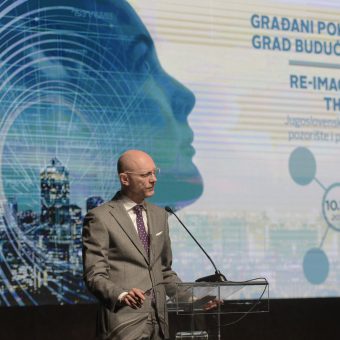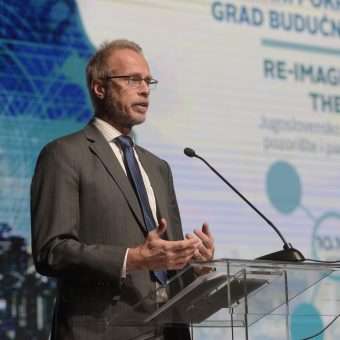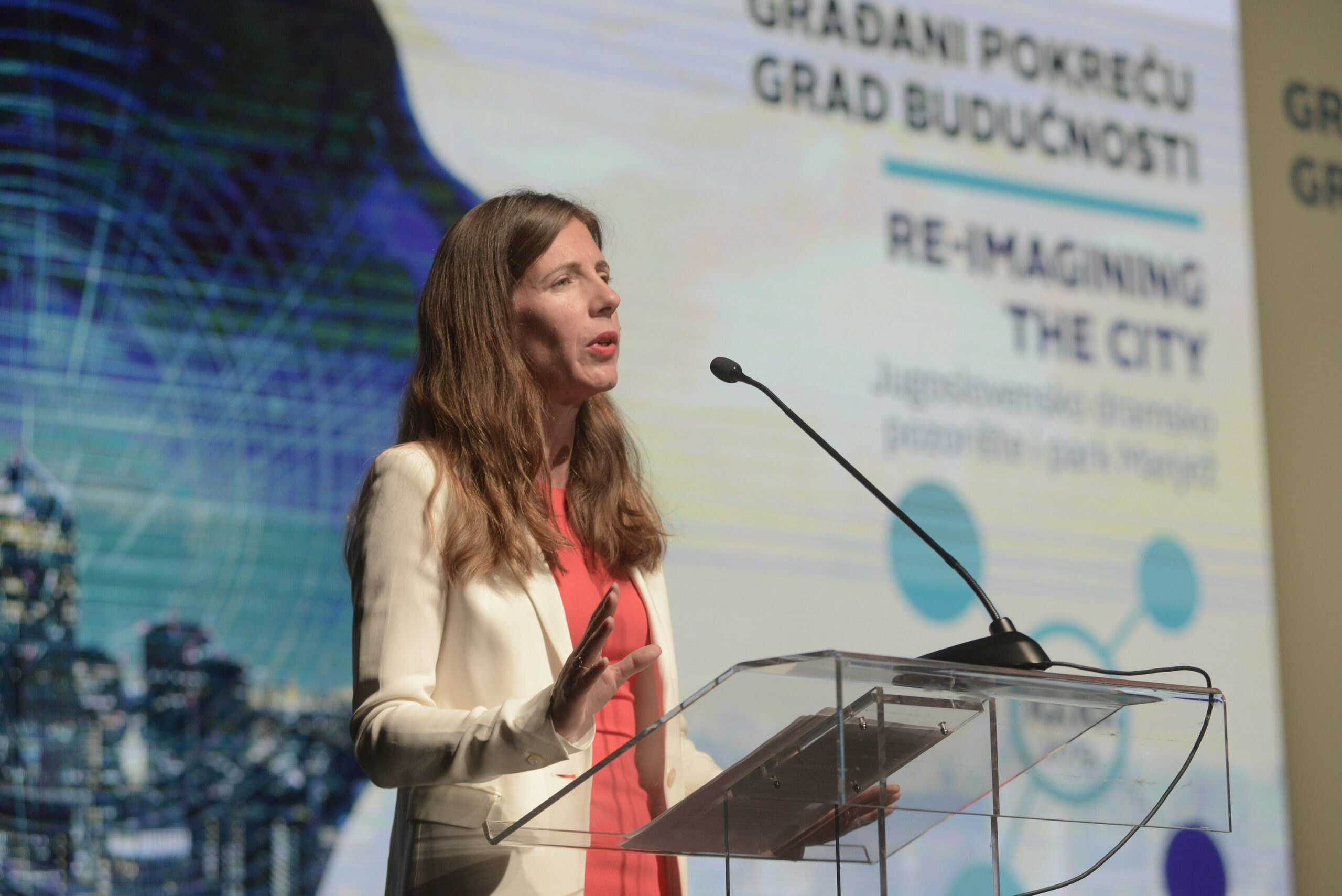Cities are crucial for the fight against climate change
Best practices and solutions for development of climate-smart cities across Europe were presented today at the event „Citizens Build Smart Cities“ in Belgrade, organized by the Ministry of Environmental Protection and the United Nations Development Program (UNDP), with support from the Global Environment Facility (GEF) ), in partnership with Adria Media Group.
The event was opened by Minister of Environmental Protection Goran Trivan, Head of the Sector for Cooperation of the Delegation of the European Union to Serbia Yngve Engstrom and UNDP Resident Representative to Serbia Francine Pickup.
Ms. Pickup emphasized that cities have a key role to play to the fight climate change, which is why at the recent UN Climate Change Summit in New York, leaders of states, private sector and civil society have launched numerous initiatives to transform cities into energy-efficient, inclusive and sustainable places to live. At the Summit, the youth took the keynote and sent a message saying that we are responsible for taking action immediately.
„More than half of the world’s population lives in cities and two-thirds will live in cities by 2050. Cities also produce more than 70 per cent of the world’s greenhouse gases emissions and use 80 per cent of the world’s energy. They are the places where the effects of the climate emergency are already severely felt, particularly amongst the most vulnerable population“, explained Pickup.
She recalled a joint initiative of the Ministry of the Environmental Protection and the UNDP, which with the support of the Global Environment Facility, supports innovative solutions to reduce the emissions of GHG in Serbia:
„UNDP works with the national and local governments to translate global and national climate goals into concrete actions. The Ministry and UNDP awarded the five most advanced solutions which implementation will cut around 500.000 tons of CO2 for Serbia, which equals planting trees on a territory of 145 football fields. These five innovative technological solutions and business models will also increase the use of renewables, improve resource and energy efficiency, tackle urban food waste and build smart city infrastructure“, said Pickup.
Serbia’s Minister of Environmental protection Goran Trivan spoke about activities taken by Serbia to reduce GHG emissions and create climate-resilient urban communities.
„The Ministry is working to establish an institutional, legislative and strategic framework to fight climate change. This implies the adoption of the Draft Law on Climate Change, which will serve as a basis for encouraging many activities. Also, a Draft Climate Change Strategy with an Action Plan has been prepared, which will determine the direction of low-carbon development and the path to reducing greenhouse gas emissions through specific mitigation measures. It is already evident that our ambitions to reduce GHG emissions under the Paris Climate Agreement will increase two to three times compared to 2015. In addition, as part of the revision of the Nationally Determined Contributions, Serbia will elaborate the aspect of adapting key economic sectors to the expected climate change, primarily in agriculture, water management, forests but also natural resources and public health protection“, explained Minister Trivan.
He reminded that, according to the data of the Statistical Office of the Republic of Serbia, 60.8 per cent of the population lives in cities in Serbia. However, this percentage will increase, as well as effects on the quality of life. Communities are expanding, but green spaces are decreasing. The number of vehicles on the streets, the amount of municipal waste and wastewaters and air pollution will increase as well as the consumption of energy for heating and cooling. All of this has the effect of increasing greenhouse gas emissions and intensifying the impact of climate change.
„The population of cities is demographically younger than in the other settlements, which makes it a driving force that we must count on to develop in the future. Younger generations are using modern technology from a very young age. And their innovative usage has proven to be crucial for greater engagement in developing climate-resilient cities“, concluded Trivan.
By the end of the year, a new European Green Deal will be presented. The goal is to increase EU 2030 GHG emission reduction target towards 55 % up from the 40% currently agreed, announced Head of the Sector for Cooperation of the Delegation of the European Union to Serbia Yngve Engstrom.
„The measures we will take within this Deal will be aimed at protecting biodiversity, reducing pollution and GHG emissions, strengthening the circular economy and tax measures consistent with these measures. The EU donated € 400 million so far for environmental protection in Serbia. We support the alignment of legislation with the EU, as well as development of a new Climate Law and Climate Strategy, which should be adopted by the end of the year“, said Engstrom.
Experts from Italy, Bulgaria, Finland, Northern Macedonia and via live streaming from London, Maribor, Milan, Helsinki, Madrid have presented the concrete measures to fight climate change and to develop sustainable cities. Throughout the Panels, more than 100 participants had the opportunity to hear experts’ experiences on innovative approaches, technical solutions, new technologies, open data, circular economy and development strategies that will contribute to the creation of climate-smart and sustainable cities and municipalities. Representatives of public and private companies presented the realized infrastructure solutions for the development of smart cities
Within this event, workshops were held on the topic of open data and an alternative way of financing projects, while the Fair of Ideas, Technologies and Business was held at Manjež Park.
The event was organized as part of a five-year “Climate Smart Urban Development Challenge” project, which contributes to making local communities and cities in Serbia more resilient to climate change through the development of projects to reduce greenhouse gas emissions through partnerships between the public, private and civil sectors. The Ministry of Environmental Protection implements the project with the support of the United Nations Development Program (UNDP) and the financial support of the Global Environment Facility (GEF). The project partners are the Delegation of the European Union to the Republic of Serbia, the Government of the Kingdom of Sweden, the Government of Switzerland, Innovation Fund and the Standing Conference of Cities and Municipalities.




